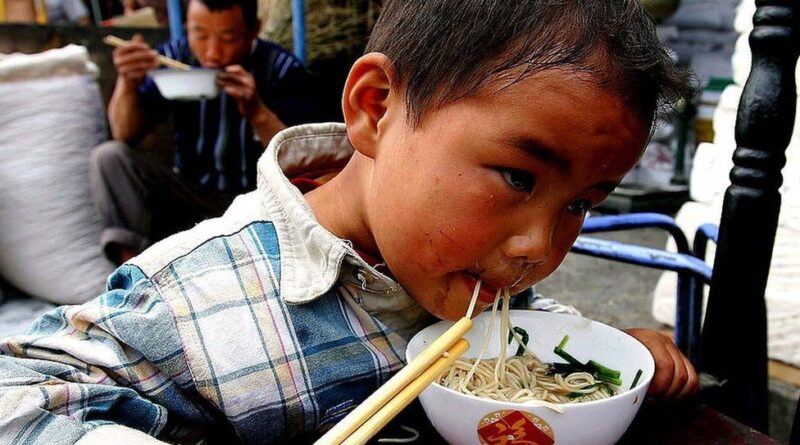Is China really stuck in big trouble due to food shortage?
Chinese President Xi Xinping has launched a new version of 2013’s ‘Clean Your Plate Campaign’ this month and asked people not to waste food. Apart from this, he has also talked about promoting low spending.
According to the report of China’s official newspaper Global Times, Xi Xinping has asked to spread awareness on the issue, describing the food wastage as “shocking and disappointing”. He said that such a social environment should be created in which waste of food is seen from the point of view of embarrassment.
China Global Television Network (CGTN) quoted Xinping as saying, “Although China has produced bumper for many years, there is still a need to spread awareness about food safety.” The effect of the Kovid-19 is like an alarm for us. “
Immediately following Xi Xinping’s statement, the government media began to encourage him not to waste food in different forums.
Government media figures were also cited for this. According to these figures, Chinese consumers have wasted 17 to 18 tonnes of food in big cities in the year 2015.
Another Chinese state media ‘CCTV’ criticized those who eat too much food while streaming live for their fans and later vomit.
This campaign of the state media has raised the apprehension in the minds of analysts that the food crisis in China is not being hidden under the guise of waste and irresponsible behavior of the people?
All ‘beat green’ for the government media
Government media has not paid much attention to the concern that China is facing some kind of food crisis due to crop failure due to Kovid-19 or natural disaster in many provinces.
The media has also emphasized that China has well controlled the effects of food production, locust outbreaks and epidemics.
It has been emphasized in the government media that despite the crop wastage due to rains in the southern part of the country, China is fully prepared on the food security front and the situation is under its control.
State news agency ‘Xinhua’ says that China is confident of having a “splendid crop in the spring” despite the outbreak of locusts and the 2003 flood in the Three George Reservoir.
Chinese media has also claimed that there is enough stock of paddy, wheat and other grains in the country. The media has even said that this year there has been more crop of paddy.
Quoting data from the Chinese Ministry of Agriculture, it has been told that the total grain yield in China in 2019 has been 664 million tonnes.
According to Chinese TV channel CGTN, it has 210 million tonnes of rice and 134 million tonnes of wheat, while the country currently consumes 143 million tonnes of rice and 125 million tonnes of wheat.
The Global Times has written in a report that a greater crisis can arise for China due to food shortages due to pandemics or floods.
China told ‘fake news’
There are reports and comments on Chinese media and Chinese social media platforms such as tightly controlled Weibo, where people are being asked not to collect food grains or believe ‘fake news’ is being spread about food shortages. You are being asked not to do it.
Government media is publishing editorials, reports and comments about this that the Western media is misunderstanding the country’s food security and the drive to prevent food wastage.
Earlier this year, there were similar reports at the time of the outbreak of Corona virus.
Chinese media and analysts tried to show public concern over the report by the government think tank, which warned that by 2025, there could be a 130 million tonne difference in food supplies in China. This was attributed to urbanization, increasing age of laborers in rural areas and increasing consumption of per capita food.
The Rural Development Report 2020, jointly released by the Rural Development Institute of the Chinese Academy of Social Sciences (CASS) and the China Social Sciences Press on August 17, also states that domestic supplies of wheat, rice and maize are also By 2025, there will be 25 million tonnes less than the demand.
However, researcher Li Gussiang, who was involved in preparing this report, said that some media institutions misunderstood the report.
On August 19, he wrote in the Chinese government newspaper Global Times, “Actually, the shortfall in domestic supply can be met by importing. In such a situation, China’s food security will not have any problem. “
Reporters Chen Hui and Hu Junhua of Yisai, a private business news website run from Shanghai, wrote on August 16 that the food supply gap the CASS report referred to was nothing compared to China’s vast production potential. Is not. However, he also stressed that relying on imports would not be good for China’s national security.
He wrote, “China cannot depend on imports for this lifeline strategically important. It does not seem practical to depend on imports to feed 1.4 billion Chinese people.”
Blame Western Media
Government media, especially the Global Times, published in English, has targeted the Western media for the issue related to China’s food security.
On August 17, according to an article published in it, “Some Western media have published false news that due to heavy floods in southern China and increasing tension with America, there is a danger of food crisis all over China.”
However, instead of bashing the foreign media on this matter, the Chinese-language domestic media targeted the ‘rumors spreading online’ inside the country.
On August 4, the state-run Economic Daily held a post on social media regarding the grain crisis and blamed the social media news channel run by a man for creating a bogeyman.
Most of China’s social media users are in favor of the government’s campaign not to waste food. As part of campaigns to prevent food wastage, restaurants do not allow customers to order more food. If the food remains, then ask him to take it home.
Some people are taking even harder steps to save food waste. Some have suggested stopping production of alcohol made from grains.
Campaigning against ‘big belly stars’ ie people who eat large amounts of food while livestreaming has also become very popular among Chinese social media users. They have started describing such videos as ‘vahiyat’ and ‘waster’.
However, some people have also opposed this behavior.
As one Weibo user wrote on August 13, “People have the freedom to eat and
To see the rest. The society in which everything is banned is very bad. “



